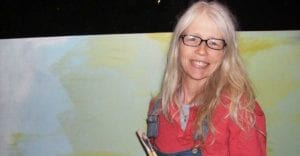 She’d been feeling sad all week and she said it was because of a conflict with her lover or place of employ or caused by reading too many vacuous comments in the newspaper and the proud ignorance and misanthropy of the readers got her down. Or its cause was the news video she watched of a Mexican agricultural day-laborer today, a single mother of three, who locked her children in a concrete block room with a large metal chain on the outside of the door for the eight hours she picked peppers in the hot sun. (“I just have to leave them here because I don’t have enough money,” she said.) The young children are in the hot room (too young yet to pick the vegetables themselves, under six) awaiting her, and we see their eyes lifting to the gaps in the door where the chain is secured.
She’d been feeling sad all week and she said it was because of a conflict with her lover or place of employ or caused by reading too many vacuous comments in the newspaper and the proud ignorance and misanthropy of the readers got her down. Or its cause was the news video she watched of a Mexican agricultural day-laborer today, a single mother of three, who locked her children in a concrete block room with a large metal chain on the outside of the door for the eight hours she picked peppers in the hot sun. (“I just have to leave them here because I don’t have enough money,” she said.) The young children are in the hot room (too young yet to pick the vegetables themselves, under six) awaiting her, and we see their eyes lifting to the gaps in the door where the chain is secured.
Or because she’s a writer of books, and she’d written some for which she can’t yet find publishers. So perhaps self-pity was the source of her woes (a song in which a Canadian sings “I was running through the 6 with my woes” played in her mind.) And she walked around Berkeley missing the vacationing lover, bemoaning the state of publishing (another rejection received five days ago), the state of her own mind which didn’t settle her into her chair to continue working on her current novel (to add to a growing pile of manuscripts), and it was these preoccupations of hers, self-important, vain, self-absorbed, and her doubts and fear which made her a good American citizen, or at least an average one, if the comments in newspaper were anything to go by.
In a news article, a presidential hopeful said They’re bringing drugs and crime, they’re rapists when speaking about immigration and Mexicans. She supposed he was “building his name brand” by doing so. One individual commented about the presidential hopeful’s speech, “Finally someone is speaking the truth, and if the truth hurts, so be it.”
The Mexican day-laborer in Sinaloa makes seven dollars US per day filling up plastic buckets with the hot peppers she picks by hand. She would make seven dollars per hour in the US (the journalist in the video showing the poor mother who locks her three children in a concrete block room offered these statistics. “It’s really horrible,” she said into the camera after looking in through the hole at the children.)
In the last weeks of summer, the writer and her son have spent much of their free time watching an old television show set in a hospital where people died and experienced conflict and the main character offered several platitudes at the show’s end as a “lesson” or moral. In a recent episode the actress spoke of loneliness while another actress, who had lost her fictional lover to disease, lay on the bathroom floor looking sad. And although this was cheap storytelling—an obvious manipulation of sentiment—it did its trick, rising in her the self-pity for the absent incommunicative lover, the disappointments in her career, the general worries about money and stacks of bills. The three Mexican children didn’t enter her thoughts, however, or the look of fear on their mother’s face when she saw the cameraman and journalist in front of her locked door as she returned from her day in the fields and they were peering in at them.
A few days ago, the writer engaged in an argument at her place of employ with several professors of literature about the relevance of Shakespeare’s plays. She found herself, strangely, having to defend their merits to her colleagues. And for some reason, not entirely understood by her, the disagreement about the plays’ continuing importance, and the story of the indigent mother without recourse, and even the image she had of herself of a week prior when she sat on a bench in a shopping mall for several hours with a deep, familiar (because it has been with her since childhood) and paralyzing loneliness, converged in her, or like spokes on the same wheel, connected in her mind. How the mysteries of literature, the truths it touches, not easily articulatable when one speaks about it—for it is an experience had in the realm of the imagination— “make us see what otherwise we wouldn’t have seen, through a sound that was never heard before.”[1] Art, as Nietzsche famously said, “is the great metaphysical activity of man.” And criticism and cheap commentaries and bad TV and self-pity and even the changing trends in the canon can no more touch it than Adam could God’s finger in the famous painting. And the Mexican mother, her children locked in a hot room in Sinaloa all day long, and the sad despairing writer on a bench in San Francisco will not endure as long as the storm raging on the moor while King Lear rails against the gods after they have abandoned him.
But perhaps, she thinks, it is simply that I have not devoted myself enough to literature.
[1] Calasso, Roberto. Literature and the Gods. New York: Vintage International, 2002. 176 – 177.







